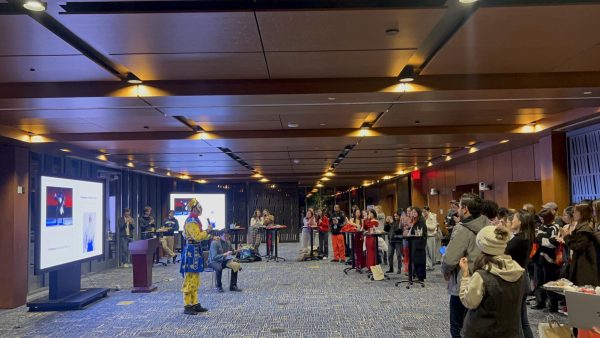The East Asian Policy Association (EAPA), a student group at the McCourt School of Public Policy that builds community among students with ties to or interests in East Asia, hosted a Lunar New Year celebration for students, graduates and faculty Jan. 31.
The event, which included Chinese opera performances, trivia, a dumpling-making activity and calligraphy, took place at McCourt’s Capitol View Convening Space and drew over 100 attendees. EAPA, which includes a number of international students from across East Asia, organized the program to share the culture surrounding traditional Lunar New Year celebrations across East Asia with the Georgetown University community.

Danlei Liao (GRD ’25), vice president of EAPA, said she felt inspired to host the event to foster a sense of community among McCourt international students celebrating Lunar New Year.
“We actually have a bunch of international students in master’s programs and, especially in our class, a lot of them are Chinese international students,” Liao told The Hoya. “In my first-year experience at Georgetown, I sort of felt like we are a community that’s kind of isolated or othered. I feel the need or the motivation to promote our heritage and culture and just to have us as a community to be seen and heard more through an organization. Lunar New Year is a great cultural opportunity to bond people together.”
The event featured traditions from Chinese and Korean cultures — including calligraphy, Korean board games, Beijing opera performances and dumplings — that reflected the diversity of both EAPA members and the countries that celebrate Lunar New Year. The holiday is celebrated in North and South Korea, China, Vietnam, Singapore and Malaysia, among other countries.
Shun Liu (GRD ’25), president of EAPA, said he intended for the event to share East Asian culture with the wider Georgetown community.
“In the Asian community, definitely a lot of people — Chinese, Japanese, Vietnamese, Korean — all celebrate New Year, but some of the people who are not in this community probably are not very familiar with the culture or the festival,” Liu told The Hoya. “We definitely want people to at least know this thing exists. We want them to know more about what we celebrate in this specific day or in this specific period.”
Liu, who also performed a Beijing opera piece alongside two other performers at the event, said the event’s performances sought to provide a full, traditional experience for attendees.
“We are trying to show this culture through the full experience,” Liu said. “We provide the full costume, the makeup, trying to get people to feel impressed about what they’ve seen. Before each of the performances, we ask the performer to explain the background, why we dress like that and why we do the makeup like that to provide some context to the audiences.”
Liao said while the group’s cultural events draw attention within the McCourt community, she hopes that more students will engage with EAPA’s professional and policy programming.
“We do more than just the cultural events that we have, because I feel like the school usually reaches out to us or shows their interest in our events only when we’re doing cultural stuff,” Liao said. “I feel like this is one way that we engage people, but we are a policy association and we have a lot of panels, inviting alumni to give career advice or on certain policy topics. We also want to show that we actually have that aspect as a very big part of our organization.”
Guanhua Xu (GRD ’25), who volunteered to lead a trivia activity at the celebration, said the experience made him feel a strong sense of connection to the Asian student community at McCourt.
“I think this is the most interesting club event I’ve ever been to as a graduate student — maybe because I’m part of it,” Xu told The Hoya. “I had lots of friends coming to say hi and also playing the trivia that I was doing. I feel like people were having fun and it was a very meaningful moment for me, connecting us to a bigger cultural group here in the United States.”
Liao said the event connected students across cultures, fostering a welcoming, supportive space to celebrate the holiday.
“I think we’re just proud of our culture, and we’re willing to support each other and share it with a broader audience,” Liao said. “We were trying to make it very welcoming to everyone, and it was such a family moment for people to make connections, meet their friends and spend quality time with their close ones, even away from home.”